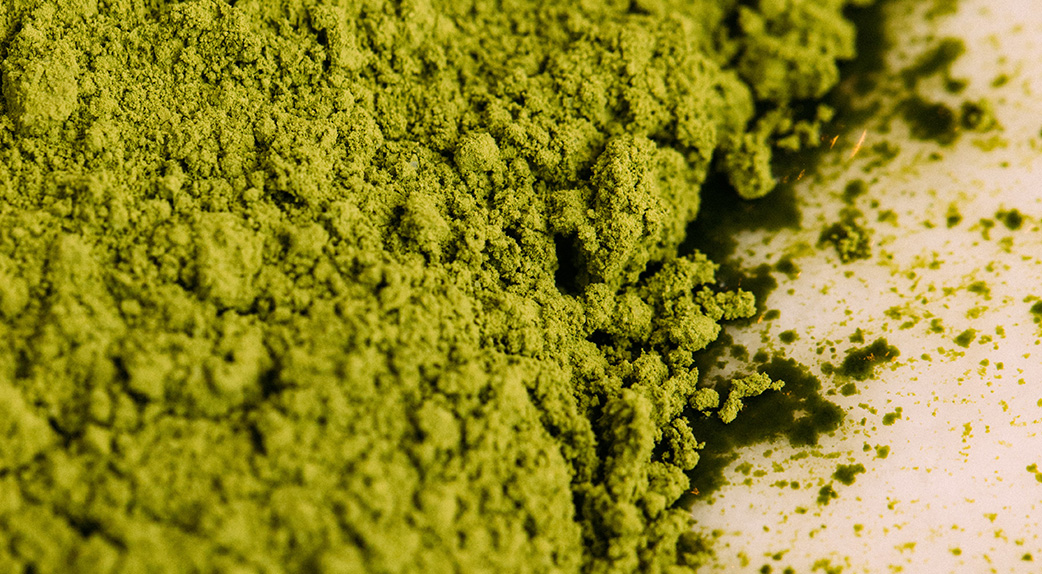Are you a matcha tea lover? You have certainly heard

Where does matcha tea come from?
Traditionally consumed in Asia, particularly in Japan, matcha tea is a drink appreciated for its many benefits.
Matcha, which comes in the form of a jade green powder, is the result of grinding the leaves of the Camellia Sinensis plant. This plant grows at high altitudes in the southern part of Japan, away from the sun and pollution. Very rich in antioxidants and chlorophyll, the leaves are ground into a very fine powder, from which 100% of the properties are consumed. This is why matcha tea has a greater antioxidant power than its green tea cousins!
How to prepare matcha?
Hot water, 1 to 2 g of Kusmi Tea organic matcha, whisk energetically for a few moments with a chasen, and that's it! Those with a sweet tooth can add a dash of milk. However, be careful with the temperature of the water, which should not exceed 80°C as this could damage the leaves, degrade their benefits or make the drink too bitter. As for the brewing time, it is generally recommended to brew for 1 minute.
Matcha and its benefits
Matcha tea is one of the few green teas where the whole leaves are used. When fully ingested, they release their properties for increased benefits and pleasure.
Drinking green tea, including matcha, could :
• Facilitate the elimination of waste by the body through its draining properties.
• Boost energy and provide a good dose of energy by reducing fatigue.
• Soothe! Yes, matcha, like green tea, contains an amino acid called L-theanine. This molecule is said to have an effect on stress and anxiety levels. This is why matcha is classified as a natural stimulant and not as a stimulant like coffee. With matcha, you can say goodbye to the nervous spike that usually accompanies a cup of coffee.
• Finally, this green tea powder is also highly concentrated in antioxidants (egcg). Naturally present in our diet, antioxidants protect our body in the long term by fighting the action of free radicals and the development of certain diseases. They also have an impact on the premature ageing of cells and strengthen our immune system!
In short, matcha strengthens the body's immune system. You feel more energetic to face the day!
Possible side effects of excessive consumption
In view of the list of its many benefits, is it possible that matcha tea could be the cause of certain side effects on health? Yes, because it contains theine, also called tea caffeine, but also tannins! Kusmi Tea explains!
Did you know that? Theine and caffeine are in fact derived from the same molecule, with the difference that theine diffuses throughout the day in the body, whereas caffeine is available immediately.
The side effects of caffeine on the body
As you can see, just as coffee, if consumed in excessive quantities, can cause certain side effects on health, the same applies to the tea family! And matcha is no exception to the rule.
Here are the side effects that can be triggered by caffeine if it is consumed in excess:
• Headaches
• nsomnia and anxiety
• Stomach ache and constipation
To prevent the effects of matcha tea and take full advantage of the benefits of your favourite beverage, Kusmi tea shares some tips with you.
Does matcha tea have an impact on the absorption of iron by the body?
Like all teas, matcha can have an impact on the body's ability to absorb iron. This mainly concerns non-haem iron.
Haem iron is found in foods of animal origin: meat, fish, seafood, etc. Non-heme iron comes from plant foods: legumes, cereals, vegetables, oilseeds, tofu, etc.
Opt for a reasonable consumption
As with any beverage containing caffeine, a reasonable amount of matcha tea is recommended. Each person has a different tolerance to theine/caffeine. The recommended doses may not be suitable for you. If in doubt, consult your doctor.
Haem iron is found in foods of animal origin: meat, fish, seafood, etc. Non-heme iron comes from plant foods: legumes, cereals, vegetables, oilseeds, tofu, etc.
It is advisable not to exceed 2 to 3 cups of matcha per day, in order to avoid the possible side effects mentioned above.
The quality of your matcha tea
To better appreciate this beverage and take advantage of its benefits, choose a quality matcha tea. An organic matcha tea will be a guarantee of taste, ecological values and a healthy composition. The organic designation guarantees numerous quality controls during the production and processing of the tea! Is the powder green and intense? Then you are not mistaken!
Spacing your intake from meals
It is generally recommended to space your cup of tea 2 hours before and after your meal. This way you can be sure that the tea will not affect your iron levels.
Kusmi Tea, an organic matcha made in France
At Kusmi Tea we offer you
Convinced? We invite you to taste our organic matcha tea powder straight from Japan, you won't be able to do without it! During the harvesting process, we make sure that only the best leaves are used.
Enjoyable at any time of the day, matcha tea is a real source of goodness. But too much of it can have side effects on your health. The key? At Kusmi Tea, we recommend that you keep your consumption in moderation and listen to your body, as we don't all have the same tolerance to caffeine.
Read also on the same subject:
Does black tea have any side effects?

